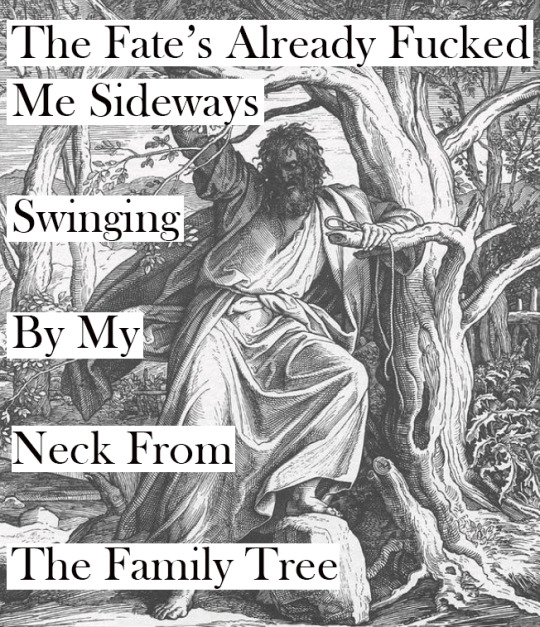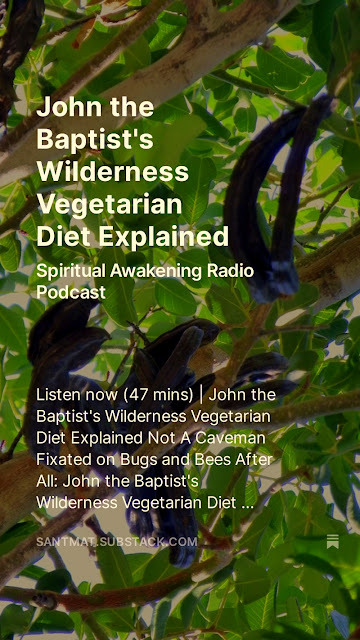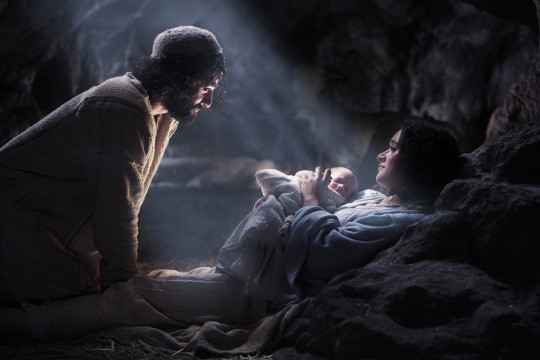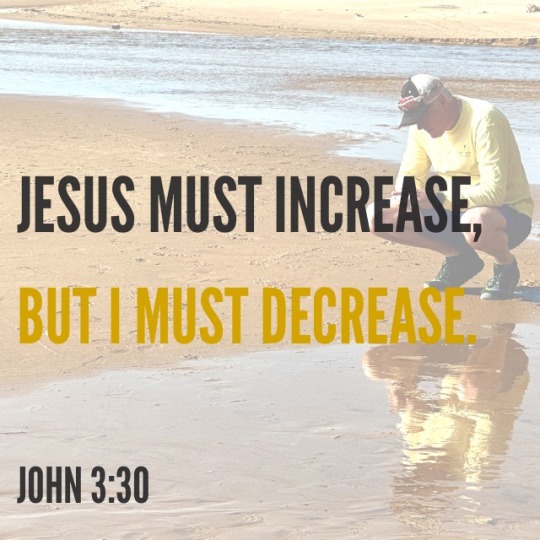#gospel of matthew
Text
Jesus was really right when he said the poor will always be with us. A lot of christians have struggled with Matthew 26:11, and it has caused a lot of people to subconsciously justify a de-prioritizing of the poor; we can bedeck our churches in opulence while people starve. We can make priorities of everything that makes our lives easier, and leave the hard work of caring for the poor for later, for our "thoughts and prayers." The poor will always be with us, so they can wait while we attend to our internal hungers.
I think what Jesus meant is that human greed will corrupt every system, which will always result in poor or disenfranchised people. We've tried a bunch of different socio-economic structures since then, and not one of them has worked to uplift all people. The eternal struggle against evil isn't about fighting off intangible demons, it's about fighting off the evil in our own hearts. We are never going to construct a "perfect system" that eliminates poverty automatically because someone will always try to take advantage of it. Instead, we must work every day, even when things are good and people are taken care of, to make sure that we see each other as deserving of dignity. We are never going to be able to legislate, dictate, or delegate our way into perspective. We have to work towards it, consciously, to make sure those around us are cared for. Vanity of vanities, a generation goes and a generation comes, but the poor remain forever.
The poor will always be with us because someone is always going to try and profit by depriving others. It is our mission and responsibility to improve as much of it as we can.
#the poor will always be with you#Ecclesiastes mention#matthew 26#theology#godblr#religion#liberation theology#autumn preaches#christianity#gospel of matthew
55 notes
·
View notes
Text

The Star of Bethlehem, Edward Burne-Jones, between 1885 and 1890
#Advent#Christmas#Christmas Eve#art#art history#Edward Burne-Jones#religious art#Biblical art#Christian art#New Testament#Gospels#Gospel of Matthew#Adoration of the Magi#Pre-Raphaelite#Pre-Raphaelite Brotherhood#pre-raphaelisme#British art#English art#19th century art#Victorian period#Victorian art#watercolor#Birmingham Museum and Art Gallery
183 notes
·
View notes
Text

Death of Judas Iscariot - Gospel of Matthew / Family Tree (Intro) - Ethel Cain
#Death of Judas Iscariot#Gospel of Matthew#judas iscariot#family tree (intro)#ethel cain#preacher's daughter#mine#edit#typo#typography#web weaving#lyrics#text#writing#collage#art#lyric#painting#♡
462 notes
·
View notes
Text
Fasting can so easily be done with the spirit of pride. And if we think that observing Jesus' command —"do not let your left hand know what your right is doing (Mt 6:3 [cf. 6:16-18])— means never telling anyone anything about our fasting we are mistaken. For the most dangerous audience for spiritual pride is ourselves. For this reason, sharing our Lenten program with someone who knows us well (like a spouse, a close friend or relative, a spiritual advisor), and letting them express their honest opinion about it, and thus being ready to reconsider it — this is a sign of a healthy Lenten fast, or a practice designed to take us out of ourselves, to relativize our wills, and so expand our hearts to embrace the fully cosmic plan of God revealed at Easter. We might grow in some virtue (or at least lose some weight) by giving up sweets for Lent. But, then again, we'll likely grow in many virtues we really need if we submit our program to the judgment of another, and humbly ready ourselves to hear something like, "Oh, that's nice, but perhaps what you might really want to work on this Lent is something like…"
- Fr. John Bayer, O. Cist (Fasting in the Rule of St. Benedict During Lent). Bolded emphases added.
#Cistercians#Benedictine#Catholicism#Christianity#fasting#humility#spiritual direction#pride#Gospel of Matthew#submission#virtue#asceticism#Lent
44 notes
·
View notes
Text

Forgiveness
‘For, if ye may forgive men their trespasses He also will forgive you — your Father who [is] in the heavens; but if ye may not forgive men their trespasses, neither will your Father forgive your trespasses.
— Matthew 6:14-15 | Young's Literal Translation (YLT)
Young’s Literal Translation of the Holy Bible is in the public domain.
Cross References: Matthew 5:7; Matthew 7:2; Matthew 18:35; Mark 11:25; Luke 6:37; Ephesians 4:32; Colossians 3:13
#forgiveness#trespasses#God the Father#unforgiveness#Matthew 6:14-15#Gospel of Matthew#New Testament#YLT#Young’s Literal Translation of the Holy Bible
13 notes
·
View notes
Text
Links to Gospels below:
Gospel According to Matthew
Gospel According to Mark
Gospel According to Luke
Gospel According to John
*not adding Acts of the Apostles b/c it's after Jesus' Resurrection
#catholic#bible#christianity#catholicism#roman catholic#roman catholicism#matthew#st matthew#mark#st mark#luke#st luke#john#st john#st matthew the evangelist#st mark the evangelist#st luke the evangelist#st john the evangelist#gospel#gospel of matthew#gospel of mark#gospel of luke#gospel of john
101 notes
·
View notes
Text

IF JESUS HAD DIED IN 2000
Paul would be writing his various letters* in the 2020's
*the letters that most scholars consider genuine; Galatians, 1 Thessalonians, 1-2 Corinthians, Romans, Philipians & Philemon
- a generation later and having never known Jesus in person
Gospel of Mark won't be written until around the 2030's
- with no claims of Jesus' virgin birth, ascension and divinity
Gospel of Matthew won't be written until around the 2040's
- with the first record of virgin birth, Bethlehem origin, guards & angel at tomb
Gospel of Luke won't be written until around the 2050's
- with the first record of a post-resurrection Jesus eating, appearing & disappearing and ascension to heaven
Gospel of John won't be written until around the 2060's
- with the first record of the incarnation of Jesus (god-man), divinity claims of Jesus, the seven "I am" sayings of Jesus and Jesus' lengthy discourse with Pilate
This sure sounds like something that people just made up.
#christianity#jesus christ#bible#gospels#bible study#saint paul#gospel of mark#gospel of matthew#gospel of luke#gospel of john#resurrection myth#resurrection#virgin birth#virgin birth myth#origin of the bible#obvious fiction#religion#religion is a mental illness
134 notes
·
View notes
Text

Matthew, chapter 14. (In the translation by David Bentley Hart.)
6 notes
·
View notes
Text
John the Baptist's Wilderness Vegetarian Diet Explained - Spiritual Awakening Radio Podcast

Not A Caveman Fixated on Bugs and Bees After All: John the Baptist's Wilderness Vegetarian Diet - Locust Beans Not Bugs - An Exploration of Early Christian Writings and Scholarly Texts Today on This Spiritual Awakening Radio Podcast.
Nevermind the old Sunday school notion of John the Baptist being some weird caveman dude dining on bugs! John may have a tarnished caveman reputation of eating locusts and honey out in the wild, but this is really a story about copyists mistranslating a Greek word as "locust" ('a-k-r-i-d-e-s') instead of "carob" ('e-g-k-r-i-d-e-s'). (Henry Ford: "Anyone who stops learning is old, whether at twenty or eighty. Anyone who keeps learning stays young." Albert Einstein: "Intellectual growth should commence at birth and cease only at death.")
Since my original research on this topic, a couple more early Christian apocryphal writings have come to light, have been made available in English. These add to the surprisingly large collection of vegetarian references in early Christian writings regarding the diet of John the Baptist. New Testament Apocrypha, Vol. III, by Tony Burke was published and some John the Baptist books are included. In one of the earlier volumes there was a John the Baptist text made available for the first time in English that has a vegetarian passage regarding John's diet in the wilderness. Included in the third volume are, The Birth of Holy John the Forerunner, and, The Decapitation of John the Forerunner, both containing plant-based passages about John's diet consisting of "locusts from the tree" (in the Middle east called "the Saint John's Tree", and "Carob Tree") and "wild honey", also "an abundance of bread and wild honey dripping from a rock". Clearly there was an understanding in early Christianity that this was referring to locust beans (carob pods), not insects. Carob pods do look a bit like locusts hanging from tree branches, hence the name. Locust beans can be ground up and used to make a kind of Middle eastern carob flour flat bread. There's a "cakes dipped in honey" reference in the Gospel of the Ebionites. The wild "honey" was not from bees but sticky desert fruit of some kind. So, as you'll hear being documented during this pod...cast, there are all these plant-based references to John's diet coming from many different sources, and scholars have noticed and discussed these: "Probably the most interesting of the changes from the familiar New Testament accounts of Jesus comes in the Gospel of the Ebionites description of John the Baptist, who, evidently, like his successor Jesus, maintained a strictly vegetarian cuisine." (Professor Bart Ehrman, Lost Christianities: The Battles for Scripture and the Faiths We Never Knew) "His [John the Baptist's] food was wild honey that tasted like manna, like a cake cooked in olive oil." (The Other Gospels, Accounts of Jesus from Outside the New Testament, by Bart Ehrman)
John the Baptist was a prophet with large number of followers in Israel and Transjordan regions. After his passing, several of his successors headed what became various rival Nasoraean (Nazorean) sects, one of those being Jesus and the Jesus movement. "Again Jesus said to his disciples: Truly I say to you, among all those born of women none has arisen greater than John the Baptizer." (Matthew 11:11, George Howard's translation of Shem-Tob's Hebrew Gospel of Matthew, described as "the oldest extant Hebrew version of the Gospel of Matthew")
John the Baptist's Wilderness Vegetarian Diet Explained - Spiritual Awakening Radio Podcast - Listen and/or Direct MP3 Download @:
https://traffic.libsyn.com/spiritualawakeningradio/John_the_Baptists_Wilderness_Vegetarian_Diet_Explained.mp3
@ the Podcast Website With Buttons That Go To All the Popular Podcast APPS - Wherever You Follow Podcasts:
https://SpiritualAwakeningRadio.libsyn.com/john-the-baptists-wilderness-vegetarian-diet-explained
@ Apple Podcasts:
https://podcasts.apple.com/us/podcast/john-the-baptists-wilderness-vegetarian-diet-explained/id1477577384?i=1000635517078
@ Spotify:
https://open.spotify.com/episode/0lMU46P0Tm9uugwN7IRgC5
@ Audible:
https://www.amazon.com/Spiritual-Awakening-Radio/dp/B08K561DZJ
@ Google Podcasts:
https://podcasts.google.com/search/spiritual%20awakening%20radio
& @ Wherever You Subscribe and Follow Podcasts - At Your Favorite Podcast APP Just Do a Search for "Spiritual Awakening Radio" - (Apple Podcasts, Spotify, Google Podcasts, Amazon, Audible, PodBean, Podcast APP, Overcast, Jio Saavan, iHeart Radio, Podcast Addict, CastBox, etc...):
https://linktr.ee/SpiritualAwakeningRadio
May the Blessings Be,
James Bean
Spiritual Awakening Radio Podcasts
Sant Mat Satsang Podcasts
Sant Mat Radhasoami
A Satsang Without Walls
https://www.SpiritualAwakeningRadio.com
#prayer of thanksgiving#go vegan#vegan thanksgiving#john the baptist#new testament apocrypha#vegan#veg#veganism#vegan christian#christian mysticism#christian mystics#vegetarian christians#early christianity#john the baptizer#gospel of matthew#gospel of the ebionites#gospel of the hebrews#hebrew gospel of matthew#jesus#vegan jesus#happy vegan thanksgiving#spiritual awakening radio podcasts
13 notes
·
View notes
Text

The Transfiguration. Folio (tempera colors and gold leaf on parchment) from a 13th century Byzantine manuscript by an unknown illuminator. Now in the Getty Center, Malibu, CA.
#Lent#Ash Wednesday#art#art history#Middle Ages#medieval art#Byzantine#Byzantine art#manuscript illumination#illuminated manuscript#illustration#Biblical art#Christian art#Christianity#religious art#New Testament#Gospels#Gospel of Matthew#Transfiguration#13th century art#Getty Center
270 notes
·
View notes
Text
He said to them, "Why are you afraid, you of little faith?" Then he got up and rebuked the winds and the sea, and there was a great calm.
The men were amazed and asked, "What kind of man is this? Even the winds and the sea obey him!"
Matthew 8:26-27
5 notes
·
View notes
Text
The list of Jesus' ancestors is a bit unhistorical. Matthew tries to make three sets of fourteen names each. The middle set of names skips a few generations in order to make the list add up to fourteen names.
The number fourteen is important for that is the symbolic number for the name of David. By producing three lists of fourteen, Matthew is saying that Jesus is three times more important than David. Hebrew had no superlative degree, so saying a word three times in a row was their way of expressing that idea (e.g., holy, holy, holy means the holiest). Jesus was three times "David," and he was therefore the "Davidest."
Rev. Jude Winkler, O.F.M. Conv.'s commentary on Matthew 1:1-17
24 notes
·
View notes
Text

The Genealogy of Jesus Christ
1 The book of the genealogy of Jesus Christ, the Son of David, the son of Abraham:
2 Abraham was the father of Isaac,
Isaac the father of Jacob,
and Jacob the father of Judah and his brothers.
3 Judah was the father of Perez and Zerah by Tamar,
Perez the father of Hezron,
and Hezron the father of Ram.
4 Ram was the father of Amminadab,
Amminadab the father of Nahshon,
and Nahshon the father of Salmon.
5 Salmon was the father of Boaz by Rahab,
Boaz the father of Obed by Ruth,
and Obed the father of Jesse.
6 Jesse was the father of David the king.
David the king was the father of Solomon, by her who had been the wife of Uriah.
7 Solomon was the father of Rehoboam,
Rehoboam the father of Abijah,
and Abijah the father of Asa.
8 Asa was the father of Jehoshaphat,
Jehoshaphat the father of Joram,
and Joram the father of Uzziah.
9 Uzziah was the father of Jotham,
Jotham the father of Ahaz,
and Ahaz the father of Hezekiah.
10 Hezekiah was the father of Manasseh,
Manasseh the father of Amon,
and Amon the father of Josiah.
11 Josiah was the father of Jeconiah and his brothers about the time they were exiled to Babylon.
12 And after they were brought to Babylon,
Jeconiah was the father of Shealtiel,
and Shealtiel the father of Zerubbabel.
13 Zerubbabel was the father of Abiud,
Abiud the father of Eliakim,
and Eliakim the father of Azor.
14 Azor was the father of Zadok,
Zadok the father of Akim,
and Akim the father of Eliud.
15 Eliud was the father of Eleazar,
Eleazar the father of Matthan,
and Matthan the father of Jacob.
16 And Jacob was the father of Joseph, the husband of Mary, of whom was born Jesus, who is called Christ.
17 So all the generations from Abraham to David are fourteen generations, from David until the exile to Babylon are fourteen generations, and from the exile in Babylon to Christ are fourteen generations.
The Birth of Jesus Christ
18 Now the birth of Jesus Christ happened this way: After His mother Mary was engaged to Joseph, before they came together, she was found with child by the Holy Spirit. 19 Then Joseph her husband, being a just man and not willing to make her a public example, had in mind to divorce her privately.
20 But while he thought on these things, the angel of the Lord appeared to him in a dream saying, “Joseph, son of David, do not be afraid to take Mary as your wife, for He who is conceived in her is of the Holy Spirit. 21 She will bear a Son, and you shall call His name JESUS, for He will save His people from their sins.”
22 Now all this occurred to fulfill what the Lord had spoken through the prophet, saying, 23 “A virgin shall be with child, and will bear a Son, and they shall call His name Immanuel,” which is interpreted, “God with us.”
24 Then Joseph, being awakened from sleep, did as the angel of the Lord had commanded him, and remained with his wife, 25 and did not know her until she had given birth to her firstborn Son. And he called His name JESUS.
— Matthew 1 | Modern English Version (MEV)
The Holy Bible, Modern English Version. Copyright © 2014 by Military Bible Association. Published and distributed by Charisma House.
Cross References: Genesis 22:18; Genesis 25:19; Deuteronomy 22:23; Deuteronomy 24:1; Ruth 4:18; Ruth 4:20; 1 Samuel 1:20; 2 Samuel 7:12; 2 Samuel 11:27; 1 Kings 3:5; 1 Kings 11:43; 1 Kings 15:24; 2 Kings 24:14; 1 Chronicles 2:12; 1 Chronicles 3:14; Isaiah 7:14; Jeremiah 22:30; Jeremiah 27:20; Haggai 1:1; Matthew 16:16; Matthew 16:20; Matthew 27:17; Luke 1:31; Luke 2:7; Acts 5:19; Romans 1:2
#Jesus#Jesus' genealogy#Jesus' birth#Joseph#Mary#angel of the Lord#Matthew 1#Gospel of Matthew#New Testament#MEV#Modern English Version Bible#Military Bible Association#Charisma House
15 notes
·
View notes
Text
Let them alone: they be blind leaders of the blind. And if the blind lead the blind, both shall fall into the ditch.
— Matthew 15:14 (KJV)
7 notes
·
View notes
Text
Who Looks Good?
This many seem like an obvious question—who exactly am I trying to make look good: me or Jesus?—but a biography in the Gospels caused me to ponder this question in a different way.
Listen to the podcast of this post by clicking on the player below, and you can also subscribe on Apple, Spotify, or Audible.
https://craigtowens.com/wp-content/uploads/2024/04/who-looks-good.mp3
The Gospel of John introduces John the baptizer to us like this, “He himself was not the Light; he came only as a witness to the Light” (John 1:8).
John had a similar birth announcement as Jesus had…

View On WordPress
#Gospel of John#Gospel of Luke#Gospel of Matthew#Jesus Christ#John the Baptist#Magnificat#motivation#motives#prayer#social media#testimony#witness
3 notes
·
View notes
Text

Folio 27r from the Lindisfarne Gospels, incipit to the Gospel of Matthew.
The main text contains the first sentence of the Gospel: “Liber generationis Iesu Christi filii David filii Abraham” (“The book of the generation of Jesus Christ, the son of David, the son of Abraham”).
The first line contains the word “liber” (“the book”) with illuminated letters in insular majuscule; the first three letters (“lib”) are much more ornate than the last two (“er”) in white.
The next two lines are in runic capitals (i.e. Latin letters in a rune-inspired script, also seen in the Book of Nunnaminster for example): the first of these lines partially contains the word “generationis” as “-onis” appears in the next line, followed by the contracted form of “Iesu”, namely “Ihu” with a tilde on the “h”; this type of contraction is called a nomen sacrum.
The last line is in insular majuscule and begins with another nomen sacrum, the contraction “χρi” with a tilde, meaning “Christi”. This is followed by a more compressed series of words. The first is “filii” (“son”) with an “fi” ligature and a letter “l” with two stacked “i” letters on its leg. Then “David” is seen and is formed with a letter “d” with an “a” stacked on a “v” in its counter followed by “id”. After that, “filii” is present again, however this time the “fi” ligature is replaced with the Greek letter phi (φ) due to its phonetic similarity. The last word is “Abraham”, which is split into two lines.
#lindisfarne#manuscript#illumination#illuminated manuscript#bible#gospel of matthew#calligraphy#latin#insular
4 notes
·
View notes